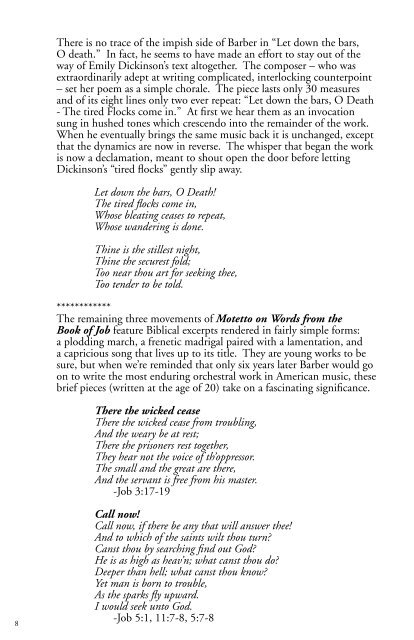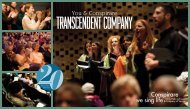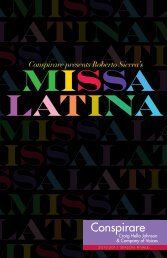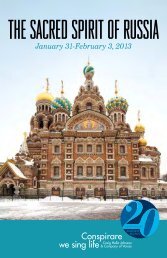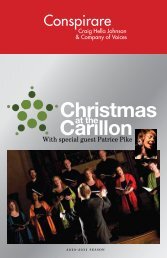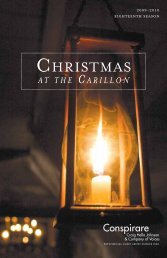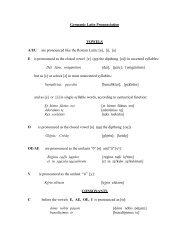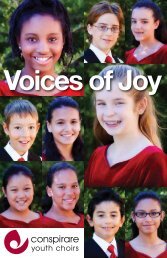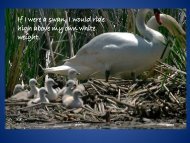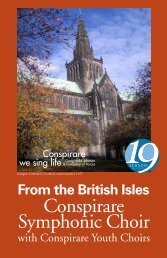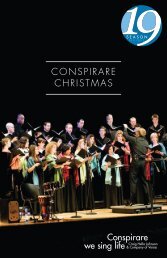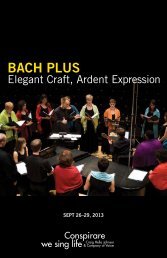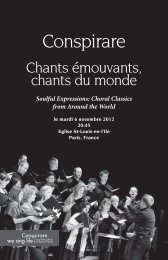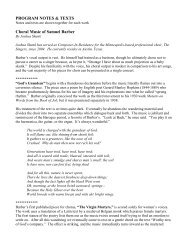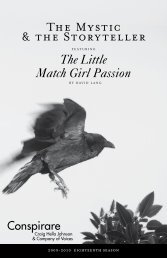Samuel Barber - Conspirare
Samuel Barber - Conspirare
Samuel Barber - Conspirare
- No tags were found...
Create successful ePaper yourself
Turn your PDF publications into a flip-book with our unique Google optimized e-Paper software.
There is no trace of the impish side of <strong>Barber</strong> in “Let down the bars,O death.” In fact, he seems to have made an effort to stay out of theway of Emily Dickinson’s text altogether. The composer – who wasextraordinarily adept at writing complicated, interlocking counterpoint– set her poem as a simple chorale. The piece lasts only 30 measuresand of its eight lines only two ever repeat: “Let down the bars, O Death- The tired Flocks come in.” At first we hear them as an invocationsung in hushed tones which crescendo into the remainder of the work.When he eventually brings the same music back it is unchanged, exceptthat the dynamics are now in reverse. The whisper that began the workis now a declamation, meant to shout open the door before lettingDickinson’s “tired flocks” gently slip away.Let down the bars, O Death!The tired flocks come in,Whose bleating ceases to repeat,Whose wandering is done.Praise Him!Praise Him! Then shalt thou forget thy misery,And remember it as waters pass’d away.And thou shalt be secure because there is peace!Thou shalt shine forth, thou shalt be as the morning!Praise Him! Amen.-Job 9:16-17************“Twelfth night” begins with the line “No night could be darkerthan this night,” and the strained, sometimes dissonant music neverlooks back. Here <strong>Barber</strong> paints anguish and despair over a text byEnglish poet Laurie Lee (1914-1997) which joins Christ’s birth to theearth’s reawakening from “utter death.” At the mention of “men withshepherd’s eyes,” the music tightens like a vice before building to aclimax a few pages later. The piece ends on a defeated note, repeatingthe same lonely text that began it.Thine is the stillest night,Thine the securest fold;Too near thou art for seeking thee,Too tender to be told.************The remaining three movements of Motetto on Words from theBook of Job feature Biblical excerpts rendered in fairly simple forms:a plodding march, a frenetic madrigal paired with a lamentation, anda capricious song that lives up to its title. They are young works to besure, but when we’re reminded that only six years later <strong>Barber</strong> would goon to write the most enduring orchestral work in American music, thesebrief pieces (written at the age of 20) take on a fascinating significance.There the wicked ceaseThere the wicked cease from troubling,And the weary be at rest;There the prisoners rest together,They hear not the voice of th’oppressor.The small and the great are there,And the servant is free from his master.-Job 3:17-19Call now!Call now, if there be any that will answer thee!And to which of the saints wilt thou turn?Canst thou by searching find out God?He is as high as heav’n; what canst thou do?Deeper than hell; what canst thou know?Yet man is born to trouble,As the sparks fly upward.I would seek unto God.-Job 5:1, 11:7-8, 5:7-8************No night could be darker than this night,No cold so cold,As the blood snaps like a wire,And the heart’s sap stills,And the year seems defeated.O never again, it seems, can green things run,Or sky birds fly,Or the grass exhale its humming breath,Powdered with pimpernels,From this dark lung of winter.Yet here are lessons for the final mileOf pilgrim kings;The mile still left when all have reachedTheir tether’s end:That mile where the Child lies hid.For see, beneath the hand,The earth already warms and glows;For men with shepherd’s eyesThere are signs in the dark,The turning stars,The lamb’s returning time.Out of this utter death he’s born again,His birth our saviour;From terror’s equinox he climbs and grows,Drawing his finger’s light across our bloodThe sun of heaven,And the son of god.8 9


